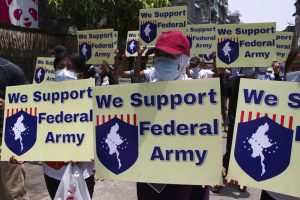Opponents of Myanmar’s military junta have formally announced plans to set up a “unity government,” releasing a new interim constitution and declaring the military-drafted 2008 constitution void – a move that is likely to harden the country’s battle lines two months since the military coup that plunged it into crisis.
The move was taken by the Committee Representing Pyithu Hluttaw (CRPH), a group of parliamentarians elected at the election in November, which is positioning itself as a nucleus of a sort of internal government-in-exile.
The CRPH announced on Facebook on Wednesday evening that it had revoked the 2008 constitution, putting forward a Federal Democracy Charter as an interim constitution, aimed at uniting anti-coup groups, ethnic armed organizations, and other opponents of the junta.
According to a declaration that accompanied the Charter (an English translation of both documents can be found here), its aim is the “eradication of dictatorship” and the creation of an inclusive federal democracy “where all citizens can live peacefully.” It also pledges to address the longstanding demands of Myanmar’s ethnic minority groups, which have been fighting for greater autonomy for decades.
The announcement came amid increasingly bloody fighting between the military and ethnic armed groups in Kayin and Kachin states, and a fierce crackdown on anti-coup protesters that has claimed at least 536 lives.
Among other things, the Charter, which was drafted with input from ethnic minority groups and civil society organizations, calls for escalating the country’s civil disobedience movement “to weaken and bring to a standstill the governance mechanism of the council of military junta” and to pledges to “abolish” the country’s existing constitution, copies of which were burnt by protesters across the country today. “The new day begins here!” tweeted Dr. Sasa, a special envoy for the CRPH.
Myanmar’s current constitution was drafted by the former military junta and passed by a flawed referendum in May 2008, in the aftermath of the hugely destructive Cyclone Nargis. The constitution secured a central political role for the military, granting it a quarter of seats in parliament, and hence, a de facto veto over constitutional amendments. It also granted it control of three of the most powerful ministries, placing it above civilian control.
In the weeks since the military’s seizure of power, the public’s demands have evolved from a reversal of the coup and reinstatement of the duly elected NLD government to more far-reaching demands for the permanent extrication of the military from politics and the scrapping of its semi-democratic constitution.
Taken as a whole, the Federal Democracy Charter promises a serious attempt to address the divides and mistrust that has poisoned relations between the ethnic Bamar-dominated central state and military and the third of Myanmar’s 54 million people that belong to ethnic minority groups.
While the announcement of the interim constitution and formation of a unity government are unlikely to make much immediate difference to the military junta, which has amply demonstrated its willingness to employ extreme violence to crush the protest movement, it has important symbolic value.
It is clearly designed to induce ethnic armed groups to ally themselves with the mass protest movement, and against the military. The scrapping of the 2008 constitution in particular addresses a long-standing demand of many ethnic minority organizations. It also heralds the creation of a more cohesive and formalized parallel government able to mount a more serious bid for international recognition.
While the stance of Myanmar’s 20-plus armed ethnic organizations has remained ambiguous since the coup, and it is unclear how many will support the Charter or join a unity government, the idea of a united front between the CRPH and these groups presents the movement’s best chance to prevail in its struggle against the coup government.
Earlier this week, three important ethnic armed groups announced their support for what they termed Myanmar’s “spring revolution” and pledged to join the fight against the junta if it doesn’t stop the killing immediately or meet calls to restore democracy. This occurred after large clashes between the military and the Karen National Union and Kachin Independence Army in the east and north of the country.
In an apparent attempt to halt the fighting and head off the creation of a united front of ethnic armed groups and anti-coup protesters, the junta announced yesterday that it was implementing a unilateral one-month ceasefire. However, it has made an exception for “actions that disrupt government security and administration,” suggesting that it will not hold its fire on the civil disobedience movement, which is explicitly geared at disrupting normal state administration.
Along with urban upheaval, a collapsing economy, and fighting along the periphery, the announcement of a new unity government is likely to push Myanmar into a dangerous new phase of its crisis. Christine Schraner Burgener, the U.N. special envoy to Myanmar, warned yesterday that Myanmar “is on the verge of spiraling into a failed state” and that it stands on the brink of civil war “at an unprecedented scale.”

































